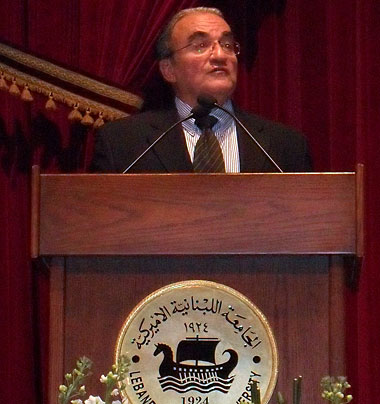If you are an Arab journalist who happened to have worked at some point with an "Establishment" newspaper or television channel (a media outlet which is either owned or backed directly or indirectly by an autocratic regime), then you must have noticed the remarkable resemblance that these organizations have with the regimes that support them.
Common features between the two (the regimes and the media outlets they support) include a high level of corruption, bullying and dishonesty.
Another common feature you would notice is that, like Arab dictators, editors-in-chief of "establishment" newspapers usually stay in their position for a significantly long period (sometimes 20 or even 30 years) and rarely let go except due to either a health reason (death or severe illness), or due to a revolt against them, be it internal or external, usually spear-headed by the a potential replacement who portrays them (the editors) as ineffective at doing their job (which is essentially praising the government and criticizing its enemies).
This obviously paves the way for the next common feature: the absolute disconnection with the people this newspaper or news channel should represent and taking the liberty to ignore all professional guidelines and journalism ethics, which at some point in the past may have resulted in effective government propaganda, but has now certainly become obsolete.
The result? Scandals such as the infamous Al-Ahram's photo-doctoring incident which was immediately unveiled by bloggers and Facebook users, or Egyptian State TV not showing protestors in Cairo's Tahrir Square when millions of people could see what was really going on Al Jazeera on other international news channels.
Of course, such behavior is not surprising when a media outlet is a mouth-piece for a government, be it Egyptian, Lebanese, Saudi or that of any other nation; simply because as "Establishment Media," the organization's existence is tied to that of the establishment and not the demand by the people for its information services.
So the obvious question is this: what happens to the likes of Al-Ahram now that the Mubarak Regime has collapsed?
In a desperate attempt to regain a tiny bit of credibility, the paper shifted its position from defending the former President to criticizing him, his family and everything they stood for. Huffington Post blogger Madga Abu-Fadil talked extensively about this transformation in a recent blog.
However, the question remains whether it is too late to regain credibility now?

Professor George Brock of City University
Professor George Brock , Head of Journalism and Publishing at London's City University, says: "Credibility and respect have to be earned and aren't acquired in a day. Particularly not Al Ahram and state TV in Egypt. If people at the top of state-controlled media want to rebuild, they have to know that one of the characteristics of an open system is that your mistakes are put on public view by your rivals."
Brock argues that even in state media there are people who can "tell good from bad", explaining that "Everything depends on the people at the top and their intentions. Are they ready to admit mistakes, promote genuine talent and abandon habits of distortion and suppression, no matter how many people are upset? If they are, then even loyalist outlets might truly transform... but don't bank on it".
However, what happens when a new government is elected and sworn in? What prevents the likes of Al- Ahram and Egypt's state owned television who are both so used to the merits of practising advocacy journalism that they might just play the same game all over again?

Dr Ramez Maalouf of the Lebanese American University
Dr. Ramez Maalouf, associate professor of Journalism at the Lebanese American University in Beirut, says: "They are very likely to become mouthpieces, albeit in a more nuanced manner than they have been to date. The alternative is for the government to create a mechanism similar to that operating in the UK, where an independent board of governors runs these institutions."
Yet, Dr. Maalouf doesn't rule out the rise of new 'media barons' as he argues that "control by the rich and powerful is inescapable in a capitalist system" while hoping that social networks and the Internet in general help attenuate the problem.
For his part, Ali Jaber, Dean of the Mohammad Bin Rashid School for Communications at the American University in Dubai, seems to be quite an optimist when it comes to the future of media in Egypt.
"In my opinion Egypt will emerge as a major media player in the Arab world at the expense of the expense of the Saudi and Gulf-funded media after being liberated," says Jaber.

Ali Jaber of the MBR School of Communication
He elaborates: "Egyptians have unparalleled media industry in terms of size and audience (85 million people), also they have developed knowhow. What they lacked was freedom and they got it ... Tunis will also lead in the Maghreb for the same reasons."
